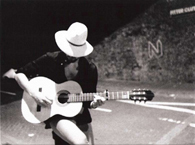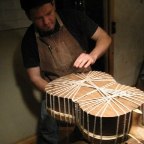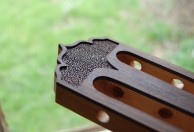Welcome to one of the most active flamenco sites on the Internet. Guests can read most posts but if you want to participate click here to register.
This site is dedicated to the memory of Paco de Lucía, Ron Mitchell, Guy Williams, Linda Elvira, Philip John Lee, Craig Eros, Ben Woods, David Serva and Tom Blackshear who went ahead of us.
We receive 12,200 visitors a month from 200 countries and 1.7 million page impressions a year. To advertise on this site please contact us.
|

|
|
Objection "Sustained"
|
You are logged in as Guest
|
|
Users viewing this topic: none
|
|
Login  | |
|

   
Patrick
Posts: 1189
Joined: Jul. 7 2003
From: Portland, Oregon

|
 Objection "Sustained" Objection "Sustained"
|
|
|
OK. I’ve been thinking about the subject of “sustain” for quite some time (I lead a boring life). They way I understand “sustain”, it is the “length of time it takes for a note to decay”. But my contention is, what most people think is “sustain”, in fact are overtones and sympathetic vibrations from other strings.
I have proven this to myself many times. I own a DeVoe negra and a Green negra, which by definition would have “high sustain”. On either of these guitars an open string note rings forever. Yet if I take my left hand and dampen the other remaining five strings, the same plucked note has a very sharp attack and dies quickly, which to me is the definition of “short sustain”.
I know the subject of Blanca, versus negra has been beaten to death, but I personally have never played a blanca that has that long, drawn out ring to it. I know most flamenco players will define a flamenco versus a classical guitar as a flamenco having a much shorter sustain, but is that really the case? And then when it comes to recordings of flamenco guitar, the engineer adds reverb that to my way of thinking, adds “sustain”! WTF! But most everyone says high sustain is bad in a flamenco guitar.
|
|
|
|
REPORT THIS POST AS INAPPROPRIATE |
Date Aug. 9 2010 21:20:36
 |
|

   
Peter Tsiorba
Posts: 130
Joined: Oct. 27 2009
From: Portland, Oregon Pacific Northwest

|
 RE: Objection "Sustained" (in reply to Patrick) RE: Objection "Sustained" (in reply to Patrick)
|
|
|
Here are my observations based on having made around 50 guitars so far.
Patrick, I fully agree that sustain has a lot to do with partials. However, a stiffer soundboard, with heavier, as well as (usually) taller bridge (think classical guitar) does seem to increase sustain of the FUNDAMENTAL notes. Even if you mute all other strings, and just pluck one, it tends to have longer sustain, albeit slower response. I believe this is the reason some of the negras I've come across have been too "classical" and to me--unsuccessful.
Allow me to rephrase your comment about blancas possibly having "no overtones." Blancas seem to have slightly "less sustaining" overtones, due to higher damping properties of cypress. Softer maples tend to exhibit even a more exaggerated damping tendency. Overtones are still there, no doubt. Without overtones, I think any guitar would have an extremely boring sound, and no personality.
If you describe sustain as "overtones" than I absolutely love them, in both classical as well as flamenco guitars. If "sustain" is long and slow when a primary note is plucked, to me that guitar suffers in many other areas, and misses my "flamenco" standards. Fast response is key, which takes the luthier back to soundboard design, mass distribution, etc.
Thanks for bringing up the topic.
I LOVE THE RIGHT KIND OF SUSTAIN! :)
_____________________________
Peter Tsiorba
Classical-Flamenco-Guitars
tsiorba.com
|
|
|
|
REPORT THIS POST AS INAPPROPRIATE |
Date Aug. 10 2010 19:25:24
 |
|

   
Patrick
Posts: 1189
Joined: Jul. 7 2003
From: Portland, Oregon

|
 RE: Objection "Sustained" (in reply to Patrick) RE: Objection "Sustained" (in reply to Patrick)
|
|
|
quote:
If you describe sustain as "overtones" than I absolutely love them, in both classical as well as flamenco guitars. If "sustain" is long and slow when a primary note is plucked, to me that guitar suffers in many other areas, and misses my "flamenco" standards. Fast response is key, which takes the luthier back to soundboard design, mass distribution, etc.
Peter,
But therein lies the rub. Here is how Wikipedia describes “sustain”:
In music, sustain is a parameter of musical sound over time. As its name implies, it denotes the period of time during which the sound remains before it becomes inaudible, or silent.
This definition in itself has nothing to do with tone, rather the rise and fall in “volume” of the note over time. So by this definition, “sustain” is a function of mechanics of the notes envelope. In other words, how long does it hold its volume (over time)?
We could have multiple envelopes of notes that have virtually the same sustain, yet look (and sound) completely different. One could have a very fast rise and decay slowly over time. One could rise slowly (classical guitar) and decay ending at the exact same time as the other. Will they sound different? Of course they will.
My contention is, you can have a short sustain, yet have overtones and harmonics on top of the note as well as sympathetic vibrations on other strings, that is “perceived” to have a long sustain, when in fact, it does not. So by definition, sustain would not shape the tone of the note, but we all know that not to be true.
But when the smoke finally clears, it all comes down to “what I like”. I may not be able to describe the tone I like, but when I hear it, I’ll let you know. No wonder after a hundred or more years, the debate still goes on about what makes a good sounding guitar.
|
|
|
|
REPORT THIS POST AS INAPPROPRIATE |
Date Aug. 10 2010 20:40:40
 |
|

   
Patrick
Posts: 1189
Joined: Jul. 7 2003
From: Portland, Oregon

|
 RE: Objection "Sustained" (in reply to Patrick) RE: Objection "Sustained" (in reply to Patrick)
|
|
|
quote:
However, it seems that Deteresa and some other contributors have isolated a different and perhpas more approriate nomenclature for the phenomenon we commonly refer to as "sustain"... "partials".
Well it gets really confusing when we discuss this stuff. The use of the term “partial” refers to “tone”, not the duration or length of the note. Sustain is the duration of the note (think time).
When a string vibrates, the main frequency it vibrates at is the “fundamental” frequency (or tone if you will). When a string vibrates it gets complicated. In fact, think of the tone generated as being complex or made of several components. If we were to analyze a tone we would see it is made up of many waves (sin waves). Partials are the many waves that make up the complex tone. Think of partials as riding on top of the fundamental frequency.
Harmonics are partials that are whole multiples of the fundamental frequency. The use of “overtones” actually refers to “partials”. The tones generated on top of the fundamental are overtones or partials.
Sympathetic vibrations refer to adjacent strings vibrating when a string is struck. And then it gets even more complicated. The string vibrating in sympathy will also have fundamental as well as partial frequencies generated.
So we see, we can’t use the terms “fundamental”, “overtones”, “partials”, ”harmonics”, etc. to describe “sustain”. It’s a whole different kettle of fish.
Even damping all other strings still creates an issue as the stuck string still has partials and harmonics, but it’s pretty much the best way for us to determine sustain.
|
|
|
|
REPORT THIS POST AS INAPPROPRIATE |
Date Aug. 11 2010 3:35:37
 |
|

   
Andy Culpepper
Posts: 3023
Joined: Mar. 30 2009
From: NY, USA

|
 RE: Objection "Sustained" (in reply to Patrick) RE: Objection "Sustained" (in reply to Patrick)
|
|
|
OK if anybody is interested here is some data I just took.
I measured 3 guitars, 2 flamencos and a classical, by striking certain notes or chords and measuring the sustain with a stopwatch. I started the watch when I struck the notes and stopped when all sound died away completely, including fundamentals, overtones, harmonics, etc. I did each test 3 times, trying to strike the string equally hard each time, and averaged the results into the final number. To damp strings I used a piece of sponge inserted under the strings at the 19th fret.
Here goes:
Guitar #1: Spruce top blanca made by me
1. Low E string, other strings open: 10 seconds
2. Low E string, other strings muted: 11.5
3. All strings open in a chord (none fretted): 12
4. High E string, others open: 8
5. High E string, others muted: 4.5
Guitar #2: Cedar top classical made by me (Indian RW, much heavier)
1. Low E string, other strings open: 10.5
2. Low E string, other strings muted: 11
3. All strings open in a chord (none fretted): 11
4. High E string, others open: 9
5. High E string, others muted: 4.5
Guitar #3: Cedar top blanca, made by my luthery teacher (this is a guitar that I have always thought of as having a lot of sustain, although it's very light)
1. Low E string, other strings open: 12
2. Low E string, other strings muted: 10
3. All strings open in a chord (none fretted): 12
4. High E string, others open: 8.5
5. High E string, others muted: 4.5
The results kind of surprised me. All the guitars are within 1.5 seconds of each other in every category, and my classical appears to have the lowest overall sustain,  although the high E sustains longest ... although the high E sustains longest ...
Another odd thing was that my on my 2 guitars, the low E string actually sustained longer with the other strings MUTED! Although the high E had consistently MUCH less sustain with the others muted.
_____________________________
Andy Culpepper, luthier
http://www.andyculpepper.com
|
|
|
|
REPORT THIS POST AS INAPPROPRIATE |
Date Aug. 11 2010 22:51:39
 |
|
 New Messages New Messages |
 No New Messages No New Messages |
 Hot Topic w/ New Messages Hot Topic w/ New Messages |
 Hot Topic w/o New Messages Hot Topic w/o New Messages |
 Locked w/ New Messages Locked w/ New Messages |
 Locked w/o New Messages Locked w/o New Messages |
|
 Post New Thread
Post New Thread
 Reply to Message
Reply to Message
 Post New Poll
Post New Poll
 Submit Vote
Submit Vote
 Delete My Own Post
Delete My Own Post
 Delete My Own Thread
Delete My Own Thread
 Rate Posts
Rate Posts
|
|
|
Forum Software powered by ASP Playground Advanced Edition 2.0.5
Copyright © 2000 - 2003 ASPPlayground.NET |
0.078125 secs.
|


 Printable Version
Printable Version





 .
. 

 )
) 






 New Messages
New Messages No New Messages
No New Messages Hot Topic w/ New Messages
Hot Topic w/ New Messages Hot Topic w/o New Messages
Hot Topic w/o New Messages Locked w/ New Messages
Locked w/ New Messages Locked w/o New Messages
Locked w/o New Messages Post New Thread
Post New Thread